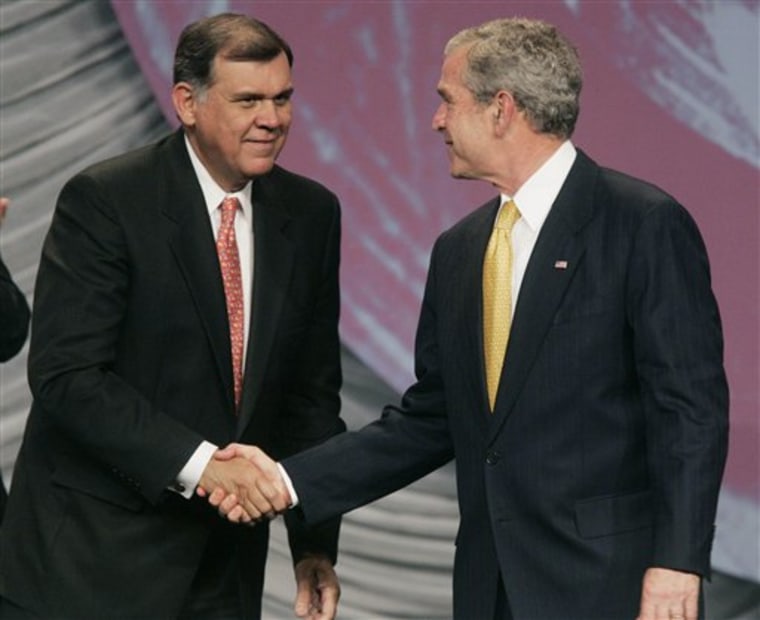Sen. Mel Martinez, tapped as party chairman to help expand the GOP's appeal to Latino voters, is struggling to bridge seemingly intractable divides among Republicans over immigration.
In months of intense closed-door talks among White House officials and key Republicans and Democrats, the Florida senator's main task has been to referee between warring GOP factions.
He has prodded business-minded moderates like himself who are eager for a politically palatable compromise to partner with hardline conservatives who are wary of one.
His bottom line: that immigration laws need to be fixed and Republicans politically can't afford to be seen as the party standing in the way of such changes.
Senators were racing to get an immigration agreement by Wednesday, when Majority Leader Harry Reid, D-Nev., otherwise will bring up a measure passed last year with strong Democratic support - but one opposed by most Republicans.
Negotiators were close to a deal that could be announced as early as Tuesday, said officials of both parties, speaking not for attribution because the talks were ongoing.
Double-edged sword
Squeezed by both sides, Martinez' precarious spot in the immigration debate reflects his party's dilemma on the divisive issue.
Strategists are eager to grab hold of the fast-growing Latino segment of the electorate and stay in good graces with powerful business groups that depend on a steady flow of immigrant labor. But then they risk alienating conservatives with an overly permissive immigration policy.
A perception in the 2006 election that the GOP was blocking a compromise on immigration "was very hurtful in many places, and it showed itself in the outcome," said the Cuban-born Martinez.
"People who had a harsh view of this lost," he said.
Political turnaround
Martinez's job as GOP party chairman has required some difficult political acrobatics for Martinez, 60, whose own experiences have shaped his views on immigration. He left Cuba as a teenager as part of Operation Pedro Pan, a Catholic Charities-organized effort that helped 14,000 unaccompanied minors escape to the United States in the early 1960s.
Last year, Martinez broke with his party and joined Democrats to help write and pass a measure that would have given many of the nation's estimated 12 million illegal immigrants a chance at citizenship.
Now he has turned against his own bill in favor of an approach with more conservative appeal that would allow legalization, but only after steep border security and worker identification measures are put in place. Critics of the compromise say it would create a guest worker program that could essentially bar some immigrants from ever gaining permanent legal status.
It's a formula designed to get more Republicans on board, although one that also risks alienating the Democrats and GOP moderates who have in the past been the strongest supporters of an overhaul.
Rather than writing legislation, Martinez says this year he has been a "conciliator" among disparate GOP blocs in the talks - from conservative Sen. Jon Kyl of Arizona to moderate Sen. Arlen Specter of Pennsylvania. Instead of advocating his own position, he has spent long hours prodding Republicans to draft a compromise the majority of them can tolerate.
"When things seems to break down, then I have, on occasion, said, 'Look, this is too important - we can't let it fail.'," Martinez said.
Party dissent
Still, Republicans who oppose any changes beyond stricter border enforcement and crackdowns on illegal immigrants are highly critical of Martinez, saying he is not representing his party. They accuse him of grasping for nonexistent political advantage by pushing measures that violate the party's basic values.
"Senator Martinez is operating off an illusion, and that is that somehow the Republican party can flourish off of rewarding illegal behavior," said Rep. Brian Bilbray, R-Calif., chairman of the Immigration Reform Caucus, a coalition of conservative Republicans and some Democrats who are opposed to allowing illegal immigrants a chance at gaining legal status, which they derisively brand "amnesty."
Meanwhile, liberal groups pushing for legalization for the undocumented workers and a guest worker program that allows new immigrants a path to citizenship accuse Martinez of squandering his unique opportunity to get it done.
Last week, a coalition of immigrant advocacy groups launched a Miami-based ad campaign criticizing Martinez for backing away from last year's Senate-passed bill. They say he has adopted a more punitive approach to immigration.
"He has the kind of position to get the White House to move this proposal in the right direction. He may be the only one who does and we don't think he's done that," said Clarissa Martinez of the Coalition for Comprehensive Immigration Reform.
Immigration analyst Tamar Jacoby of the Manhattan Institute calls Martinez the "center of gravity" in the bipartisan talks.
"He exemplifies the dilemma of the party," said Jacoby. His "instinct - not just because he's an immigrant, but because he knows what's good for the economy and what's good for the country - is to say, 'Lets figure out a rational way to do this.' But like the party, he's got these yahoos riding his coattails - a loud, vocal 25 percent of the party that doesn't want to do anything - and he has to deal with them."
